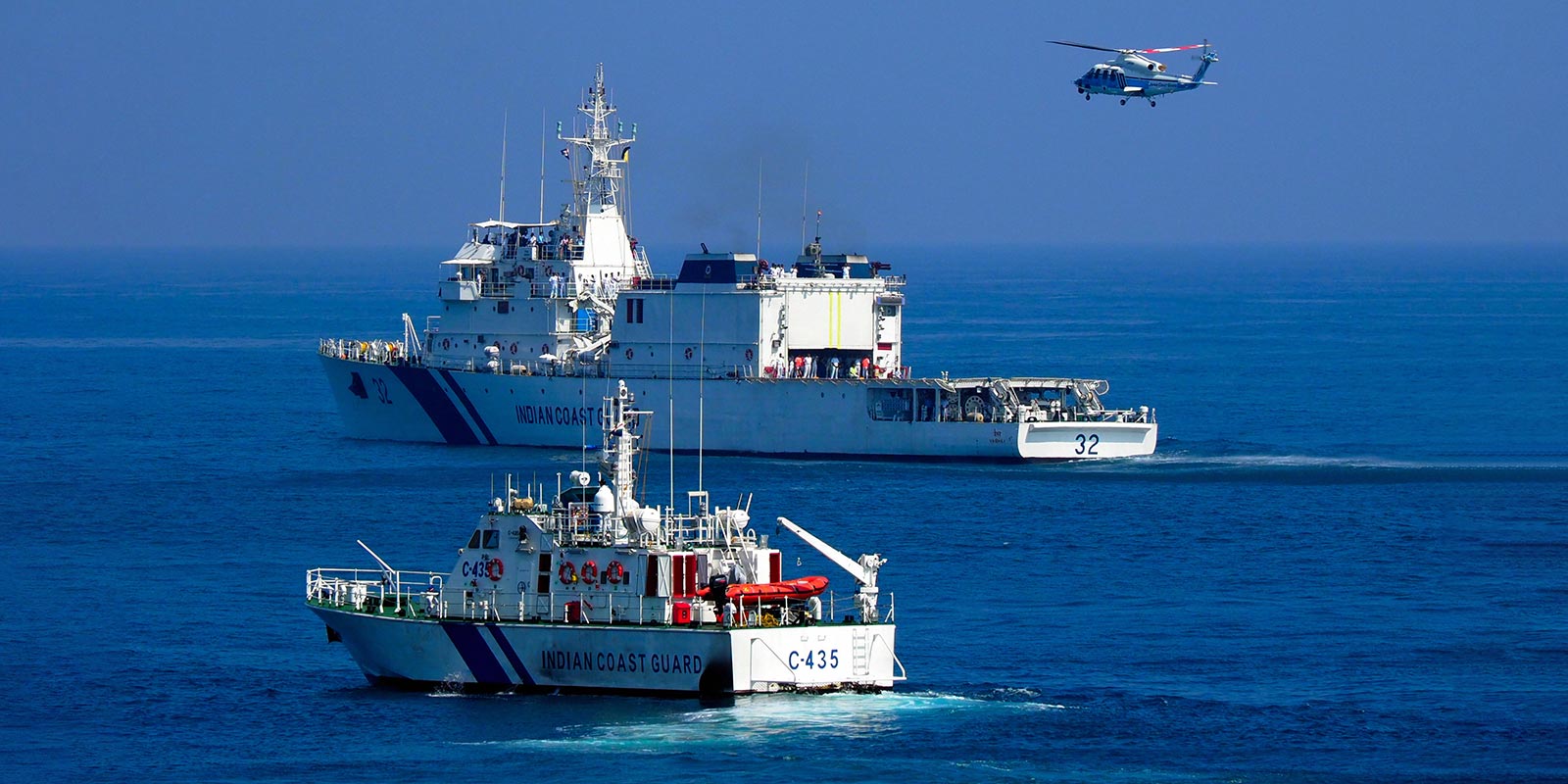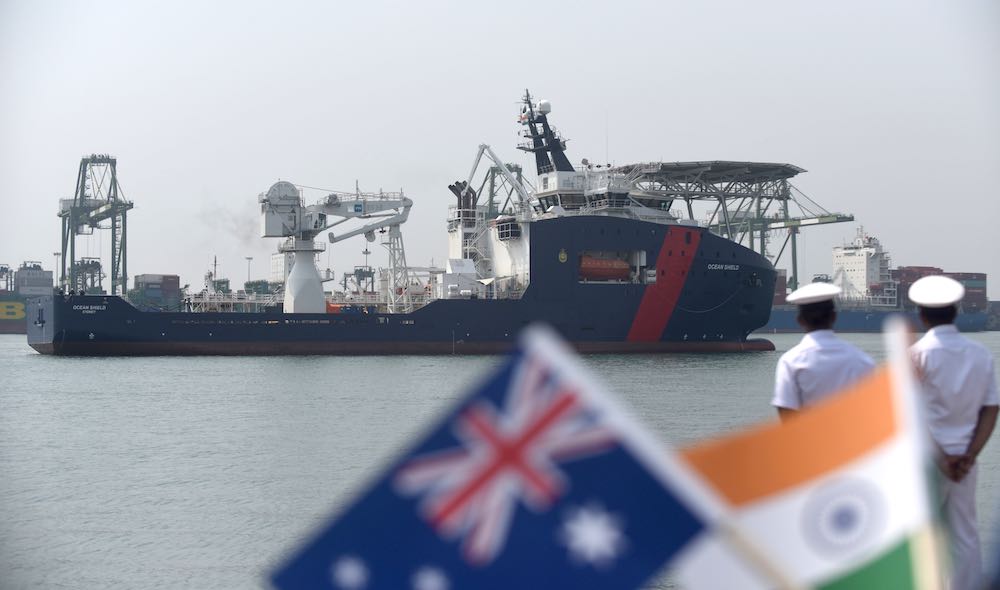DAVID BREWSTER
This modest proposal could help bring stability and
security to the Indo-Pacific, without the military fanfare.
 Published 12 Aug 2019 06:00 Australia and the Pacific - Maritime Security
Published 12 Aug 2019 06:00 Australia and the Pacific - Maritime Security
The so-called Quad group of Indo-Pacific maritime democracies – Australia, India,
Japan, and the United States – is a valuable grouping, although it is still underutilised
in many ways. One of the most effective ways that these countries could work together
to enhance maritime security in the Indo-Pacific would be through coordinating the
work of their coast guard agencies.
Much attention is now focused on naval cooperation as a way to stabilise a region
that has been destabilised by a rising and often assertive China. There is no doubt
this is extremely important, but a great deal of the legwork in maintaining maritime
security is increasingly falling to coast guard agencies. The so-called "white hulls"
of the region are
often on the front line in dealing with issues
such as piracy, illegal fishing, humanitarian and disaster relief, search and rescue,
and the smuggling of drugs, people, and arms.
White hulls are also increasingly being used in roles traditionally reserved for
navies. The maritime boundary disputes in the East China Sea and South China Sea
are now often played out between coast guards from China and other countries. This
trend will likely only continue in the future, as white-hull vessels take an ever-greater
share of responsibilities, often with the support of traditional naval assets.
There may be a similar trend between other countries. Navies have long been at the
forefront of security cooperation, but navy-navy cooperation can sometimes carry
serious limitations, driven by both cost and politics. The primary purpose of naval
‘grey hulls’ is to fight wars, and some countries are cautious about how much they
cooperate on an operational level. Coast guards are therefore not only useful for
maritime law enforcement, but can also be a convenient tool for international cooperation.
Australia’s coast guard agency, the Australian Border Force, runs on a hybrid basis,
deploying some dedicated ships and aircraft, but heavily supplemented by Australian
Defence Force assets. Its status as a civilian agency still garners it many benefits
in dealings with other countries.
Coast guard agencies across the Indo-Pacific are increasingly finding
ways to work together. The Heads of Asian Coast Guard Agency
Meeting (HACGAM) is a regional grouping that provides opportunities for networking
and information sharing among coast guards of its 22 member states.
The 16th annual HACGAM summit, to be hosted by Australia in 2020, will be an important
opportunity for Australia to strengthen its operational links with other coast guards
across Asia (although HACGAM is limited in its reach – the grouping does not include
many coast guards in the Pacific and Indian oceans with which Australia needs to
build links).

Indian Coast Guard personnel look on as Australian Border Force Cutter Ocean Shield
arrives in port for joint exercises, Chennai, May 2017. (Photo: Arun Sankar via
Getty)
Coast guards are also increasingly working together bilaterally. The Indian and
Japanese coast guards have been conducting joint exercises off southern India since
2000, a testament to the value those countries see in this form of cooperation.
Indeed, the Japan Coast Guard is often at the forefront of the country’s efforts
at maritime capability-building in the region, partnering with several countries
in Southeast Asia and the Indian Ocean. Japan’s constitutional restrictions on militarism
mean that the Japan Coast Guard has considerably greater freedom to deploy to distant
waters and partner with other countries, as compared with the Japanese navy.
The Australian Border Force has also been active in developing relationships throughout
the region in recent years, mostly on a bilateral basis. There remains a big gap,
however, in coordinating various regional capacity-building activities being undertaken
by Australia, India, Japan, and the United States.
This is where the Quadrilateral group comes in. It provides a valuable forum for
sharing perspectives among senior officials of the four countries. Some remain cautious
about the grouping, especially wanting to avoid it being perceived as a military
alliance. This is why India has been hesitant about participation by the Royal Australian
Navy in the annual Malabar naval exercises.
Quadrilateral cooperation through the countries’ coast guards could provide an answer
to this political problem. As principally law-enforcement agencies, coast guards
can provide many practical benefits in building a stable and secure maritime domain,
without the overtones of a military alliance.
A Quad of coast guards from Australia, India, Japan, and the United States could
focus on fishing, smuggling, and other maritime law enforcement without carrying
the political baggage that accompanies cooperation among navies. This could enhance
coordination among them and potentially provide a core group for collaboration with
other coast guards across the Indo-Pacific, including in the South China Sea, Pacific
and the western Indian Ocean.
Australia needs to find innovative ways to help enhance the capabilities of our
friends and partners in Asia, the Pacific, and the Indian Ocean. Cooperation and
coordination through the Quad would be an effective way of leveraging our limited
resources.
David Brewster is a Senior Research Fellow at the National Security College, Australian
National University. This piece was produced as part of a two year project being
undertaken by the National Security College on the Indian Ocean, with the support
of the Department of Defence.
This article was originally published by The Interpreter